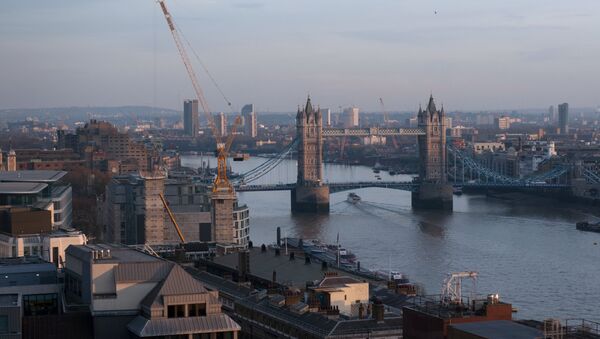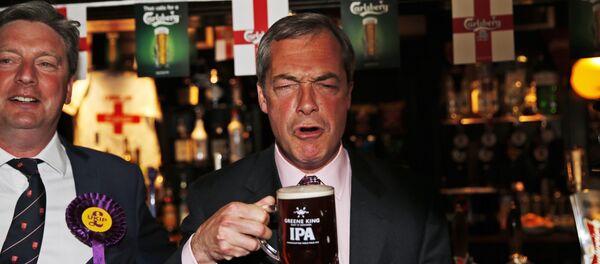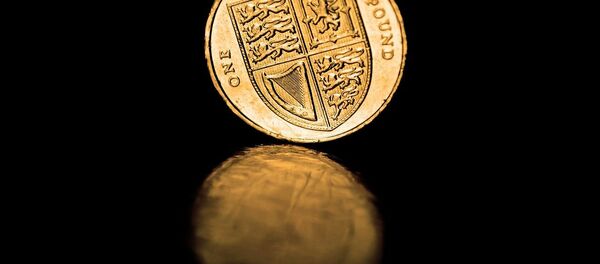Kristian Rouz – The greater the success, the greater the paranoia: albeit the Office for National Statistics’ (ONS) preliminary estimates suggest the UK was the best performer among the major advanced economies in 2016, many private sector companies have expressed rising concerns over the economic outlook into this year.
British manufacturing, however, is an entirely different story. According to the Confederation of British Industry’s estimates, quarterly business optimism index advanced to the reading of +15 in January compared to that of —8 in October, and is currently at its highest since January 2015.
On Thursday, the ONS is releasing its GDP growth figures for the fourth quarter, and preliminary reports suggest the UK outperformed other major economies for the past year. 4Q16 quarter-on-quarter growth is projected at 0.5pc, and growth for the entire 2016 is estimated at 2pc, so far the highest preliminary estimate amongst the G7.
Consumer confidence is still robust, albeit under the pressure stemming from the rising inflation fuelled by the sterling’s 15-percent devaluation for the year. Fourth quarter retail sales rose 1.4pc, even though tumbled in the crucial holiday season in December. Still, that month, consumer purchases were 4.9pc up from a year prior.
“Households appear to be entirely looking through Brexit-related uncertainties. The saving rate has fallen towards its pre-crisis low,” Mark Carney, Governor of the Bank of England (BOE) observed.
After the regulator cut its base interest rates to 0.25pc from 0.5pc in August, saving became an even less attractive strategy in personal finance planning, hence the spending spree that entailed towards the year’s end. Consumer credit has expanded significantly, a good sign for lenders.
The UK labor market, meanwhile, is solid and is near ‘full employment’ with some 74.5pc of working age people having a job. For comparison, in the US labor participation rate is roughly 62pc. Inflation is still not a major challenge to disposable incomes, at 1.6pc year-on-year in December. The British economy is still re-emerging from the disinflationary mire of the past two year, a decease that has been plaguing the European continent since after the debt crisis in the early 2010s.
“We see things changing this year,” Chris Hare of Investec and formerly of the BOE. “Economic uncertainty is still at elevated levels, particularly with fears of a hard Brexit, and the effects of the post-referendum fall from the pound are really going to kick in.”
The industrial renaissance might, however, boost the GDP growth to above these projections. As observed by the Confederation of the British Industry (CBI), manufacturing order books have expanded in the past three months, total new orders also posted substantial gains, even though manufacturers are also hit by the pound’s devaluation rendering imported raw materials more expensive.
“UK manufacturers are firing on all cylinders right now with domestic orders up and optimism rising at the fastest pace in two years,” Rain Newton-Smith of the CBI said. “The weaker pound is driving export optimism for the year ahead, but is having a detrimental impact on costs for firms and ultimately for consumers.”
Ultimately, the recent commentary from Prime Minister Theresa May regarding the Brexit process has brought some clarity, making the near-term outlook for many businesses more certain. Subsequently, the UK’s investment appeal improved somewhat as indicated by the recent capital inflows. Overall investment for the past year declined, nonetheless, with lower capital spending and foreign investment.
Despite ending the past year on an optimistic note, the UK economy is still wary of the Brexit process, which might turn out to be costly and tumultuous. The BOE, however, said the 2017 GDP figures are subject for upward revision as the performance of the non-financial sector this year might be better than can now be expected. Preliminary estimates are quite inaccurate, for example, in 2009 such estimates have proven to be too pessimistic, which might just be the case this time as well.




